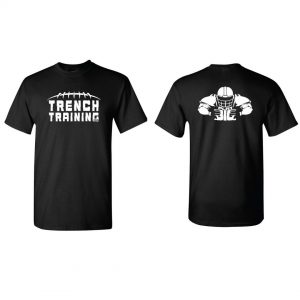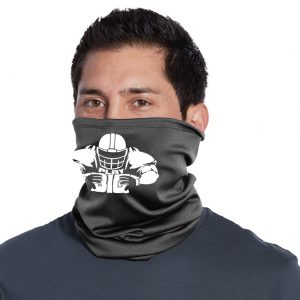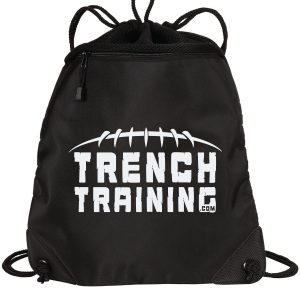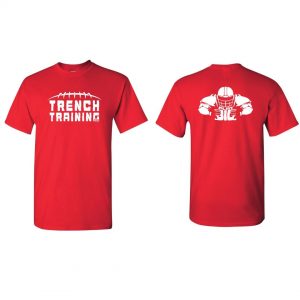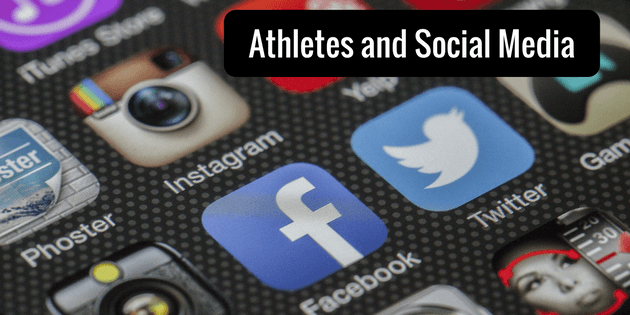
by Steve Stark | Nov 22, 2016 | Recruiting, student athletes
Athletes and social media can make for a very dangerous combination.
Not everything we think or feel should be broadcast to the world.
According to the Pew Research Center, 94% of teens are online daily.
Of that number, over 71% say they use multiple social media platforms.
These numbers will only increase as our technology advances.
When you are an athlete at the high school, collegiate or professional level, you are under more scrutiny than the average student.
Good or bad, it’s a something all athletes need to remember.
Administrators at every level are trying to be more proactive about athletes and social media use.
Many schools today offer courses or seminars for their athletes to learn how to handle social media.
Here are a few things to consider regarding athletes and social media.
3 Tips for Athletes and Social Media
1. Nothing is private.
Every single thing you post or tweet is public.
It doesn’t matter if you delete it.
Once it’s out there, there’s no getting it back.
Even if you think you are sending a private message you must consider it public.
For instance, let’s say you send a direct message to a friend ripping your high school football coach.
You and that friend have an argument.
The friend then gets upset and shares your direct message to his Twitter followers (including the coach).
If you type it, then you have to own it.
2. If you share it or retweet it, it’s yours.
What about other people’s content?
If you share a disrespectful image or message from someone else, it will be viewed as if you created the image or made the statement yourself.
You own everything that is displayed on your social media accounts.
3. Every piece of content is a direct reflection of you.
Personal branding becomes a big deal for professional athletes.
However, high school and college athletes must be thinking about their personal brand as well.
Coaches everywhere are now monitoring social media.
Most programs have people that spend all their time monitoring and reviewing potential recruits’ social media accounts.
They are tired of social media getting athletes in trouble.
Recruiters will avoid players based on their social media.
Caoches from Penn State, Duke and SMU have actually tweeted about how they “dropped” recruits because of their social media presence.
What you do on social media speaks to your character and your judgement.
Don’t let social media keep you from being recruited. Be smart.
If you wouldn’t show your account to your parents or grandparents, what do you think coaches will think?
How To Post and Share Safely
1. Be positive.
If you are going to post something, keep it positive.
No one, especially a coach, wants a negagtive player on their team.
Your tone on social media will come across clearly.
Keep the negativity to yourself and post the positive.
2. Be supportive.
How can you help others?
Lift someone up. Make someone else’s day better.
Be there for your classmates, friends and teammates.
3. Share news around your sport, school or your teammates.
What’s happening in your sport?
What information can you share that others might find interesting?
People on social media want to be informed.
4. Engage with people you admire.
Today you can interact with nearly anyone through social media.
Who are the athletes and leaders that you look up to?
Follow them and get in on their discussions.
Just be respectuful and contribute to the discussion.
5. Stay out of arguments.
Whether or not they want it, athletes are public figures.
That also means they can be targets.
Athletes have fans but they often have just as many people who want to see them fail.
Don’t get caught up in the negative stuff.
It’s easy to get baited but you need to ignore the negativity.
Never engage in an argument on social media.
It’s always best to walk away.
If you you found value with today’s post please like, comment and share.
Play Big!

Coach Steve

by Steve Stark | Feb 1, 2016 | Blog, Recruiting
A multi-sport athlete will always have advantage over those who specialize in one sport.
Specialization in youth sports has become the norm across the United States.
Parents are pushing harder than ever to “make” their child a star.
Only about 2% of high school athletes are awarded scholarships each year to NCAA colleges and universities.
Those are not good odds for your athlete.
Want a quick reality check regarding your budding scholarship athlete?
Check out this article from CBS Money Watch: 8 things you should know about sports scholarships.
I feel incredibly fortunate to have earned a scholarship to play football at the University of Wisconsin-Madison.
However, I almost made a terrible mistake as a high school junior.
My Story About Being A Multi-Sport Athlete
When I was a junior in high school I realized that I had a good chance to earn a football scholarship.
It was an exciting time but it was also a very confusing time.
I played 3 sports from the time I was 9 years old; football, basketball and baseball.
Football wasn’t even my favorite sport.
I actually liked playing basketball and baseball more than football.
However, I knew that football would offer me a way to go to college.
Prior to the start of the basketball season my junior year I was convinced that I needed to focus on football.
I was not going to try out for the basketball or baseball teams and instead spend my winter and spring in the weight room.
Luckily my parents and I had a conversation with a recruiter from the University of Wisconsin before I made that decision.
That recruiter told me that not playing basketball and baseball would be a terrible mistake.
He gave me 2 reasons that I should remain a multi-sport athlete.
2 Reasons To Be A Multi-Sport Athlete
1. Cross training.
Every sport you play requires speed, agility and power.
Building those 3 areas are done the same way regardless of what sport you play.
However, there are physical differences in the way that sports are played.
For example, football and baseball involve more short bursts and less endurance.
Basketball and soccer involve more endurance training and less short bursts.
As a multi-sport athlete, your body is conditioned differently in different sports.
You are going to train your body differently in sport with regards to speed, agility and power.
That variation in training while playing one sport sport can help you see improvements in other sports.
In my case playing basketball improved my agility and endurance in ways that “working out” could never do.
Playing baseball worked my hand-eye coordination. There’s nothing in a weight room that would have given me that training or experience.
2. Competition.
That Wisconsin recruiter really drove this point home and it has stuck with me ever since.
Every athlete should take advantage of EVERY chance they get to complete.
We only get so many chances to compete in sports. It’s a finite number.
Competition in sport teaches us things that we CANNOT learn any other way.
The experience, pressure, and adversity that we face in competition are invaluable to an athlete.
Competition helps us develop our character, build our leadership ability and teach us how to be good teammates.
None of these attributes can be truly learned outside of competition.
Great athletes ALWAYS take advantage of every opportunity to compete and then they look for more.
3 Dangers of Specialization in Sports
1. Increased risk of injury.
A Loyola University study showed that athletes that specialized in one sport were 70% more likely to be injured than children in multiple sports.
Overuse injuries make up a large percentage of sports related injuries for children.
A child’s body is still developing.
Overuse can lead to poor development and serious chronic injuries.
2. Higher likelihood of stress leading to burnout.
Children are not psychologically prepared for the stress we place on them regarding sports.
Specialization at an early age often involves a child “playing up” with older kids.
Most children are not ready mentally or socially to compete with older kids.
This can have a huge psychological effect on a child and actually be detrimental to their development.
3. Damages relationships.
There are 2 things to consider about how relationships can suffer in sports specialization.
First are the relationships of your child and other kids his or her age.
If your child is playing on select teams they are not likely playing with many of their friends.
Again with “playing up” they may not be playing with kids in their own grade.
Think about the impact of your child socially and the relationships that they are missing out on.
Second, and even more importantly, is relationship you as a parent have with your child.
You can’t just be “coach”.
You have to be mom or dad.
So many parents who have their children specialize at an early age end up with damaged relationships with their child.
Parents who drive their children for athletic perfection at a young age are creating massive amounts of stress on the children.
Can you imagine how kids must feel when they can’t live up to that perfection and they see disappointment or disapproval from a parent?
That can have a lasting effect on your relationship.
3 of the Greatest Multi-Sport Athletes
In the 2015 NFL draft, 224 of the 256 players drafted were multi-sport athletes in high school.
Here’s my list of 3 of the greatest multi-sport athletes of all time (and by the way… they were all football players).
Jim Thorpe – won Olympic gold medals, played college and professional football, played Major League baseball and had a basketball career.
Deion Sanders – Professional football and professional baseball. Only person to ever play in both the Super Bowl and the World Series.
Bo Jackson – played both professional football and professional baseball. Was an incredible player in both sports who unfortunately was limited by a hip injury.
Who is your favorite multi-sport athlete?
If you found value with this post please like, comment and share.
Let’s Play,

Coach Steve






